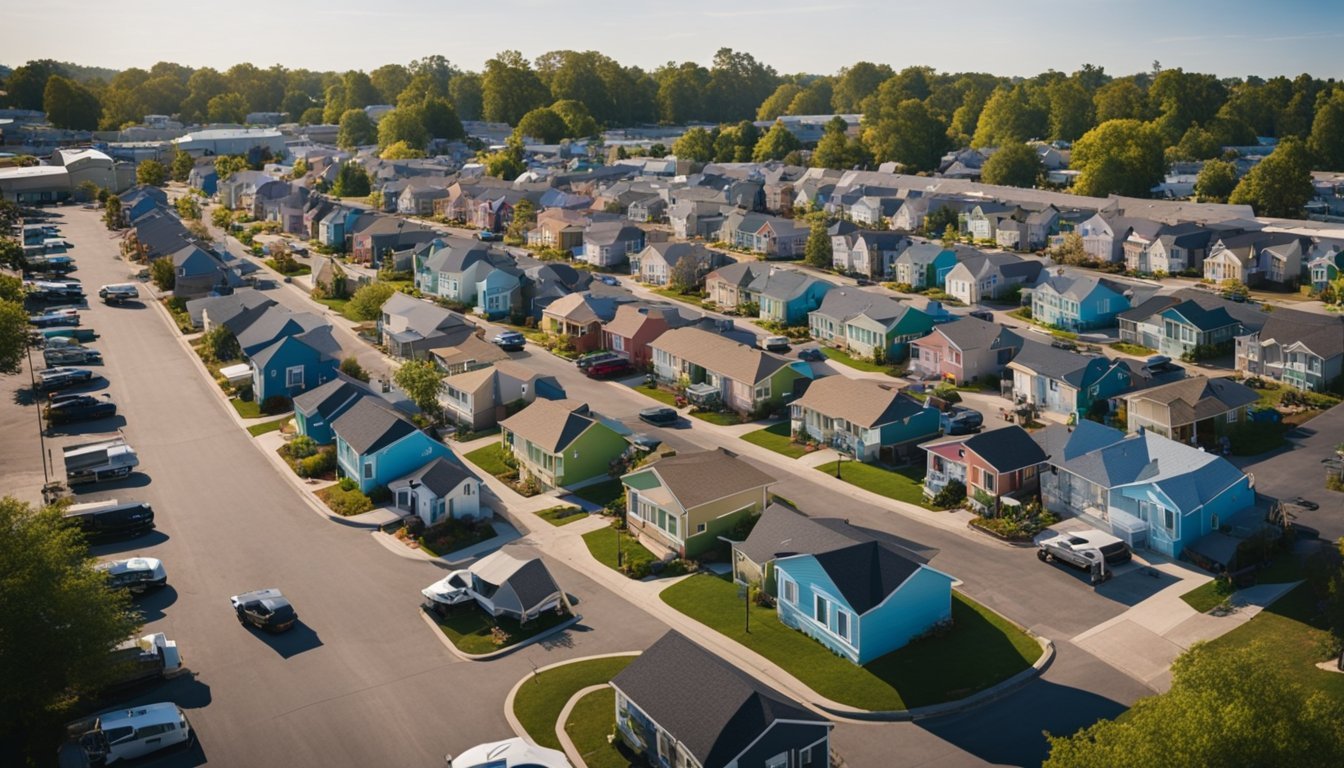The Role of Local Businesses in Supporting Trailer Park Communities
A Cultural Influence
Trailer park communities, often characterized by their close-knit nature and dynamic cultural tapestry, rely heavily on the presence and support of local businesses. These businesses, through mutual engagement and understanding, can help uphold the unique cultural identity of these communities. Local businesses play a crucial role in fostering economic stability and community well-being within trailer park environments.
From grocery stores to service providers, small enterprises offer essential services that cater to the specific needs of residents. These businesses not only contribute to the local economy but also provide spaces for social interactions that strengthen community bonds. As they engage with residents regularly, they gain insights into the cultural nuances that define these communities.
When local businesses successfully integrate themselves into trailer park communities, they often do so by respecting and embracing the cultural aspects that make these places unique. This alignment allows for a thriving relationship where both the business and the community benefit, paving the way for sustainable development and enriched cultural identity. By actively participating in community life, they become an integral part of the cultural fabric.
The Cultural Impact of Trailer Park Communities
Trailer park communities often serve as unique hubs of local culture and social dynamics. These communities weave together intricate social fabrics, fostering a sense of belonging and shared identity among residents.
Understanding Trailer Park Dynamics
Trailer parks typically host a diverse range of individuals, fostering a mix of cultural influences. The transient nature and affordability invite people from various backgrounds. Social capital thrives here as residents build close-knit networks, sharing resources and support.
Community involvement is pivotal. Residents often engage in collective activities, creating opportunities for social interactions and strengthening the bonds within the community. This dynamic generates a shared sense of local wisdom and lifestyle, forming a distinct community identity.
Local Cultures and Community Identity
The culture within trailer park communities plays a significant role in shaping residents' quality of life. Cultural heritage is preserved through traditional practices, storytelling, and local events. These elements contribute to a rich tapestry of shared experiences.
Community gatherings, such as festivals or potlucks, are common, allowing cultural exchange and celebration. Such events not only reinforce local identity but also serve as potential attractions for cultural tourism.
The ability of these communities to retain and showcase their unique cultural identity is a testament to their resilience and adaptability, even in the face of societal challenges. Through shared values and traditions, trailer park residents foster a distinct community spirit.
Local Businesses as Catalysts for Community Support
Local businesses play a vital role in supporting trailer park communities through economic contributions, fostering social engagement, and enhancing community resilience. They act as pivotal stakeholders, driving empowerment and economic benefits.
Economic Contributions to Trailer Parks
Local businesses bring significant economic benefits to trailer park communities. By creating jobs, these businesses facilitate economic development, ensuring residents have access to employment opportunities.
Their presence helps stabilize the local economy and provides essential services and goods to residents. Neighboring shops, restaurants, and service providers inject revenue into the area, reinforcing community sustenance. Investment by these businesses often leads to improved infrastructure and resources. This empowerment encourages self-sufficiency and creates a foundation for future growth and stability.
Fostering Social Engagement and Participation
Businesses engage with trailer park residents, fostering strong community ties and collaboration. Local events sponsored by these businesses encourage interaction among residents, creating a network of support and cooperation.
Activities such as workshops, fairs, and community gatherings provide platforms for participation, enhancing social cohesion. These events promote diversity and inclusion, making residents feel valued and connected. Local business leaders often collaborate with residents to address community needs, reinforcing personal relationships and cultivating a shared sense of identity.
Enhancing Community Resilience
Local businesses contribute significantly to the resilience of trailer park communities by supporting recovery during challenging times. Initiatives such as emergency preparedness programs and resource sharing are commonly facilitated by local enterprises.
Their adaptability and deep connection to the community empower swift responses to crises. By addressing challenges and using resources effectively, these businesses help maintain stability. Resilience initiatives foster a collective capacity to withstand economic and social pressures, ensuring long-term prosperity and security for residents.
Sustainable Development and Conservation Efforts
Sustainable development and conservation are critical components in fostering trailer park communities. Efforts focus on balancing economic growth with the preservation of natural resources, aiming to enhance the quality of life within these communities.
Promoting Environmental Conservation
Local businesses can play a pivotal role in environmental conservation by implementing eco-friendly practices. This includes reducing waste, utilizing renewable energy sources, and encouraging biodiversity conservation efforts.
Community involvement is crucial, where businesses engage residents in recycling programs and educational workshops. By fostering collaborations with environmental organizations, local businesses can support sustainable tourism initiatives that highlight the natural beauty surrounding trailer parks. This creates opportunities for economic growth while protecting ecosystems.
Sustainable Livelihoods and Economic Growth
Local businesses in trailer park communities can contribute to sustainable livelihoods by offering employment opportunities that align with conservation goals. Utilizing resources responsibly and prioritizing sustainability in their operations encourages broader community participation in economic activities.
Innovative partnerships with local authorities can support the development of policies aimed at promoting sustainability. Access to training in green skills helps residents find jobs in emerging sectors like renewable energy. This not only boosts the local economy but also empowers the community to maintain a sustainable way of living.
Community-Based Tourism in Trailer Parks
Community-based tourism in trailer parks focuses on both leveraging tourism for economic benefits and fostering deep cultural exchanges. Local businesses and residents play a pivotal role in ensuring activities remain sustainable and respectful of community values.
Tourism Development and Local Engagement
Tourism development in trailer parks revolves around creating immersive experiences that appeal to visitors while accounting for local dynamics. Engaging local businesses in the process provides authentic insights into the culture and daily life of the community.
Residents often collaborate with businesses to offer unique tourism activities such as guided tours, local cuisine tastings, and cultural workshops. These initiatives not only generate revenue but also encourage strong partnerships that enhance community ties and elevate the trailer park's visibility as a tourist destination.
Cultural Preservation through Tourism Activities
Cultural preservation is key to the success of community-based tourism in trailer parks. Tourism initiatives aim to highlight distinct cultural elements through carefully curated activities that both honor and share the community's heritage.
By involving local artisans, performers, and historians, tourism can facilitate cultural exchanges that educate visitors while reinforcing community pride. This approach ensures that tourism impacts are beneficial, safeguarding traditions and empowering residents to play an active role in cultural representation.
Impact of Tourism on Local Communities
The impact of tourism on trailer park communities can be both positive and transformative. Economic benefits often come in the form of increased commerce for local shops and services, which can lead to improved infrastructure and community resources.
However, it is crucial for tourism activities to be managed sustainably to prevent negative consequences such as over-tourism or cultural commodification. Community leaders and local businesses must work together to develop responsible strategies that prioritize long-term growth and community wellbeing, ensuring tourism remains an asset rather than a burden.
The Role of Stakeholder Relationships and Collaboration
Stakeholder relationships are crucial in supporting trailer park communities, particularly through their engagement in decision-making processes and fostering trust. Effective collaboration enhances the community's ability to address complex challenges and boosts the overall well-being of its residents.
Decision-Making and Public Participation
In trailer park communities, successful stakeholder collaboration is essential. Local businesses can play an integral role by participating in decision-making processes. This helps ensure that diverse perspectives are considered. Public participation allows residents and other stakeholders to voice their opinions and concerns.
Engagement from local businesses often leads to more informed decisions that reflect the needs and desires of the community. This involvement can also empower residents, giving them a sense of ownership and validation. Collaborative decision-making not only aligns with community values but also enhances the overall effectiveness of sustainability initiatives.
Building Trust and Community Well-Being
Building trust is a fundamental aspect of the relationship between local businesses and trailer park communities. Trust in these relationships can foster a supportive environment that encourages active participation from all stakeholders. Trust in government and local authorities is equally important as it contributes to a transparent and trustworthy collaborative effort.
Community well-being is further enhanced when stakeholders work together transparently. Local businesses that prioritize building strong ties with residents can help nurture an environment where everyone can thrive. This collaborative atmosphere leads to improved social cohesion, economic stability, and sustainable community development. As a result, trust and strong stakeholder partnerships ultimately contribute to the longevity and resilience of trailer park communities.
Challenges and Opportunities in the Current Climate
Local businesses play a crucial role in shaping trailer park communities, especially amid ongoing global challenges such as the COVID-19 pandemic, climate change, and evolving urban planning needs. Each subtopic highlights a unique challenge and opportunity for these enterprises.
The Effects of the COVID-19 Pandemic on Local Enterprises
The COVID-19 pandemic has reshaped how local businesses operate within trailer park communities. Small enterprises faced significant disruptions due to lockdowns and safety regulations. Many businesses struggled with reduced foot traffic and supply chain issues.
Businesses that adapted quickly by moving online or offering delivery services saw relative success. Support from local governments and community initiatives helped keep essential services running. Temporary financial relief programs proved vital for maintaining operations, though long-term viability remains a concern.
Adapting to Climate Change and Environmental Challenges
Adapting to climate change requires local businesses to reconsider their operations and services in trailer park communities. Increased flooding and weather events demand infrastructure resilience and adaptability in business planning.
Businesses have opportunities to lead by implementing sustainable practices. They can offer environmentally friendly products and services, contributing to community resilience. Partnering with environmental organizations and accessing government grants for sustainability initiatives can support these efforts. Addressing climate-linked challenges can set examples for others in these communities.
Urban Planning and the Integration of Trailer Parks
Urban planning plays a crucial role in the sustainability and integration of trailer parks into broader community frameworks. Local businesses must navigate the complexity of zoning laws and land-use regulations. Limited access to essential services and amenities can hinder economic growth.
Proactive engagement with urban planners can facilitate better infrastructure and community services. Businesses can advocate for mixed-use developments that integrate residential and commercial spaces. This creates vibrant communities where trailer parks are fully integrated into urban development plans. Such collaborations can improve living conditions and open new economic opportunities.
Strategies for Sustainable Tourism and Economic Policies
Strategies in sustainable tourism focus on implementing long-term planning and management to ensure that economic growth aligns with ecological preservation. Attention is given to the integration of local communities and businesses, fostering socioeconomic development that benefits both residents and visitors.
Implementing Sustainable Tourism Development
Successful sustainable tourism development requires local community involvement and collaboration with businesses. This approach ensures that economic activities do not degrade cultural heritage or the environment. Local enterprises play a crucial role in promoting sustainable practices through eco-friendly services and products, which attract eco-conscious tourists.
Partnerships between local authorities and businesses can also create sustainability guidelines and incentives. This cooperation encourages innovation in tourism offerings, driving both environmental preservation and economic gains.
Efforts to maintain cultural integrity should be prioritized, allowing local traditions and lifestyles to flourish alongside tourism developments. By engaging stakeholders and investing in sustainable infrastructure, communities can create a resilient tourism industry.
Tourism Planning and Management for Long-Term Success
Careful planning is essential to balance the needs of tourists and residents while preserving resources. Tourism planning should address necessary infrastructure investments, such as transportation and accommodation, which support sustainable growth without causing harm.
Efficient tourism management involves creating policies that regulate visitor numbers and activities, minimizing the ecological footprint. Businesses and local governments can implement zoning laws and conservation practices to protect natural habitats.
Data collection and analysis can guide decision-making, helping to predict trends and assess tourism impacts. Regular feedback from stakeholders is also necessary to adapt strategies that align with evolving community goals and environmental needs.
Navigating Socioeconomic Development and Tourism
Integrating socioeconomic development into tourism strategies can lead to job creation and improved livelihoods for local residents. By supporting education and training programs, communities can enhance skills related to the tourism sector, ensuring locals benefit from employment opportunities.
Collaboration between businesses and government entities helps craft economic policies that distribute tourism revenues fairly. This ensures investment in local infrastructure and services, improving residents' quality of life and making destinations more attractive to tourists.
Emphasizing fair trade practices and supporting locally-manufactured goods can strengthen the economic impact of tourism. By prioritizing equitable economic growth, communities can build a sustainable tourism framework that benefits all stakeholders.
Conclusion
The role of local businesses in trailer park communities is vital in enriching cultural assets. They serve as hubs for community events that highlight local traditions, music, and arts. This helps residents maintain a strong cultural identity and promote social cohesion.
Economic growth in these communities is spurred by the presence of small businesses. These businesses create job opportunities and provide essential services, which in turn supports family incomes and overall community welfare.
Integrated rural tourism can be a promising avenue. Small businesses can collaborate with community members to offer authentic cultural experiences. This enhances destination sustainability while simultaneously generating economic benefits and boosting local pride.
Involving local businesses in heritage management is essential. They can support initiatives aimed at preserving historical sites within trailer park communities. This partnership can ensure that cultural heritage remains a living part of the community, attracting both tourists and locals.
Ultimately, the collaboration between small businesses and trailer park communities forms a mutually beneficial relationship. This synergy helps drive economic prosperity, sustain cultural heritage, and strengthen community bonds.









